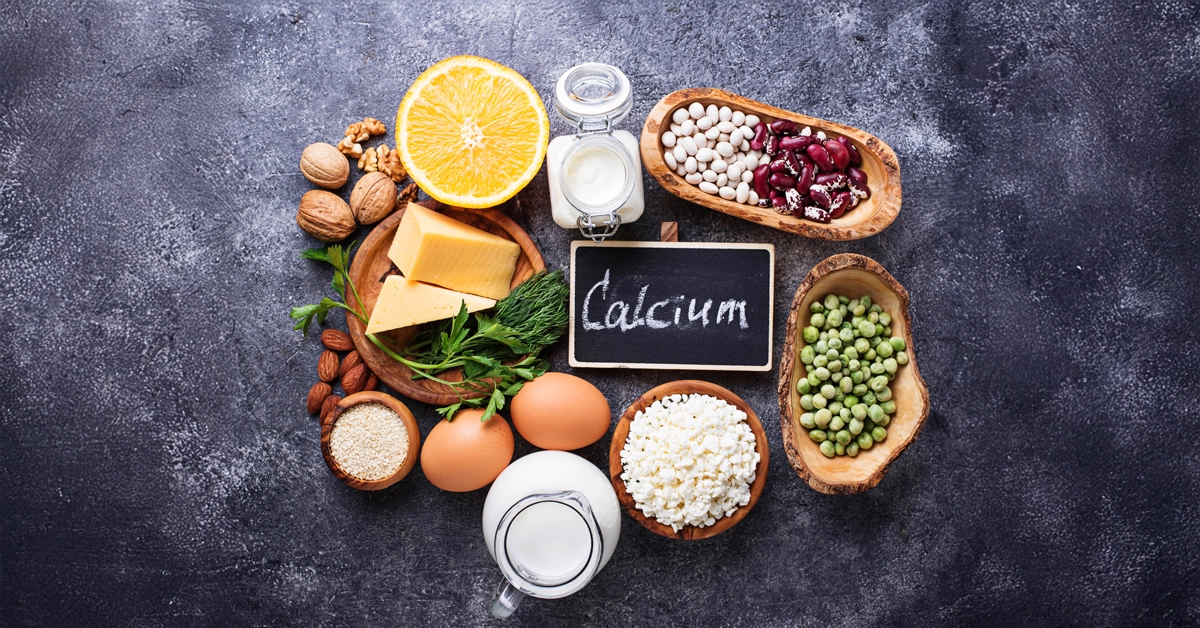Top 15 Calcium-Rich Foods to Include in a Diabetes Diet

Remember how your parents always told you to drink milk as a kid for strong bones? They had a solid reason that milk is packed with calcium. But guess what? There’s a whole array of tasty, calcium-rich foods beyond just dairy!
In this blog, we’ll explore a variety of calcium-packed foods, their health benefits, and easy ways to include them in daily meals. Whether you’re managing diabetes, focusing on bone health, or prioritizing family well-being, this guide has something valuable for everyone.
What is Calcium & Why Do You Need It?
It is not just about bones; calcium also plays a key role in muscle movement, blood clotting, nerve function, and hormonal balance. It is also essential for maintaining bone density and reducing the risk of fractures, osteoporosis, and dental issues.
Something very important that you must know is calcium works hand-in-hand with vitamin D. Without sufficient vitamin D, your body cannot effectively absorb calcium, even if your diet is rich in this mineral. Vitamin D ensures that calcium from food is absorbed properly into your bloodstream.
Why Is Calcium Good for Diabetes?
Here’s the thing. Calcium is essential for people of all ages, not just those with diabetes.
Children, pregnant women, and older adults especially need to meet their daily calcium requirements for overall health. As people age, bone density naturally decreases, leading to joint pain or fractures, often due to calcium deficiency.
That’s why maintaining a calcium-rich diet along with a balanced nutrition plan is essential for good bone health and overall well-being, particularly as we age.
What Are The Best Calcium-Rich Foods For Diabetes?
Let’s first understand one thing – there’s no special calcium-rich food just for people with diabetes. Foods high in calcium are the same for everyone.
However, not all calcium-rich foods are absorbed by the body in the same way. This depends on their bioavailability, which means how easily your body can use the calcium they provide.
Knowing this can help you choose and add the best options to your daily meals.
To know your chances of Diabetes reversal, take the Diabetes Reversal TestDiabetes Reversal
Calculator
Here’s a top list of Calcium-rich foods:
| Category | Food Source | Serving Size (g/ml) | Calcium Content (mg/serving) |
| Animal-Based | Milk | 240 ml | 290 |
| Paneer (Cottage Cheese) | 100 g | 208 | |
| Fish-Based | Sardines (Pedvey) | 100 g | 382 |
| Mackerel (Bangda) | 100 g | 241 | |
| Indian Anchovies (Mandeli) | 100 g | 232 | |
| Pomfret (Silver) | 100 g | 108 | |
| Bombay Duck (Bombil) | 100 g | 115 | |
| Prawns (Jhinga) | 100 g | 120 | |
| Plant-Based | Drumstick Leaves (Moringa) | 100 g | 440 |
| Sesame Seeds (Til) | 25 g | 351 | |
| Amaranth Leaves (Chaulai) | 100 g | 215 | |
| Lotus Stem (Kamal Kakdi) | 100 g | 257 | |
| Ragi (Finger Millet) | 100 g | 344 | |
| Mustard Leaves (Sarson) | 100 g | 118 | |
| Bengal Gram (Chana) | 100 g | 202 |
| Note: Serving size is based on a one‐half cup serving size (∼85 g for green leafy vegetables), except for milk (1 cup or 240 mL). |
These foods are high in calcium and are suitable for people with diabetes when consumed in moderation. Be mindful of portion sizes to control the intake of fat and carbohydrates.
Leafy greens like Amaranth are good plant-based sources of calcium, but their absorption is reduced due to oxalates. Oxalates bind to calcium and hinder its uptake. Despite this, they are nutrient-dense and a healthy addition to a balanced diet for people managing diabetes.
How Much Calcium Is Good for Diabetes?
The amount of calcium you need daily depends on age and gender. The average recommended daily amounts are listed below in milligrams (mg).
| Age Group | Calcium Requirement |
| Children 1 – 3 years | 700 mg/day |
| Children 4 – 8 years | 1,000 mg/day |
| 9 – 18 years | 1,300 mg/day |
| 19 – 50 years (men and women, including pregnant and lactating women) | 1,000 mg/day |
| 51 – 70 years (men) | 1,000 mg/day |
| 51 – 70 years (postmenopausal women) | 1,200 mg/day |
| Above 70 years (both sexes) | 1,200 mg/day |
What Happens If We Eat Too Much Calcium?
A common misconception is that eating high-calcium foods will automatically strengthen your bones. However, excess calcium, particularly from supplements, can have the opposite effect, as it may disrupt the balance of other crucial minerals in your body.
Overconsumption of calcium can also result in health issues such as kidney stones, digestive problems, or, in rare cases, calcification of soft tissues. It is crucial to pair calcium intake with adequate Vitamin D, as it plays a vital role in calcium absorption and bone health. Seek proper guidance from a doctor to avoid the risks of overconsumption.
How We at Fitterfly Can Help You?
Including high-calcium foods in your diet is crucial for supporting bone health and meeting nutritional needs, especially when managing diabetes.
At Fitterfly, we go beyond just helping you track your calcium intake. We provide a holistic approach to health management, covering nutrition, fitness, sleep, and stress. Our personalized care plans are designed specifically to suit your body’s unique needs.
With expert guidance, customized meal plans, and 24/7 support from our health coaches, we empower you to make better food choices for improved overall wellness.
For more details, call us at 08068507599. You can also learn more about our scientifically designed Diabetes Prime Program, which has helped more than 30,000 people manage diabetes efficiently.
Reduced diabetes medications in 3 months


6.8%
Happy members
EMI
Guarantee
4.8/5
Diabetes Prime Program
This blog provides general information for educational and informational purposes only and shouldn't be seen as professional advice.
Frequently Asked Questions
What is a good source of calcium for diabetics?
Dairy products, Drumstick Leaves, Leafy greens, almonds and sesame seeds are excellent sources of calcium for people with diabetes.
Can diabetes cause calcium deficiency?
Yes, diabetes can lead to calcium deficiency due to increased urinary calcium excretion and poor absorption, especially in individuals with uncontrolled blood sugar levels.
Does calcium cause high blood sugar?
No, calcium does not cause high blood sugar. In fact, adequate calcium intake supports overall health, including bone health, without impacting blood sugar levels.
Does calcium increase insulin?
Some studies suggest that calcium may play a role in enhancing insulin secretion, supporting better glucose control.
Why is calcium low in diabetes?
Calcium levels may be low in diabetes due to factors such as poor kidney function, insulin resistance, and vitamin D deficiency, which affects calcium absorption.
What are the 3 best foods for calcium?
The best foods for calcium include dairy products (milk, yoghurt), leafy greens (spinach, fenugreek), and plant-based milk (almond, soy milk).
Does calcium increase insulin resistance?
No, calcium does not increase insulin resistance. In fact, adequate calcium intake may help improve insulin sensitivity in some cases.
Does sugar affect calcium levels?
High blood sugar causes increased calcium excretion through urine as the kidneys work harder to manage blood sugar levels. This can lead to calcium deficiency, negatively impacting bone health.




















